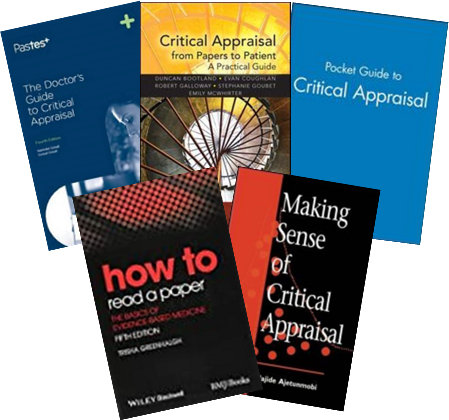What’s on this page?
How can the Library help?
Glossary of Critical Appraisal terms
Videos from Cochrane
Critical Appraisal Checklists
Statistics
Help
How can the Library help?
 Books on critical appraisal & evidence based medicine – see YorCat, our library catalogue to see what we have
Books on critical appraisal & evidence based medicine – see YorCat, our library catalogue to see what we have
e-Books on critical appraisal & evidence based medicine which can be accessed on YorCat
e-Learning – Health Education England’s e-Learning for Health site has several online courses related to critical appraisal
Training – Want to learn from a real, live person? Get in touch to arrange a training session with the Library Team – head to the bottom of the page.![]()
 Glossary of Critical Appraisal terms
Glossary of Critical Appraisal terms
Want to know your RCT from your Cohort study? Your Meta-analysis from your Blobbogram?
CASP Glossary of Critical Appraisal jargon
 Videos from Cochrane
Videos from Cochrane
A series of fairly short (mainly 10-20 minutes long) training videos outlining different types of study design and how to appraise them. Produced by the Cochrane Common Mental Disorders team – part of Cochrane, an international not-for-profit organisation dedicated to making up-to-date, accurate information about the effects of healthcare readily available worldwide.
1. Introduction to Critical Appraisal
2. Systematic reviews and meta analysis
3. Randomised controlled trials
Critical Appraisal E-learning
 Critical Appraisal Checklists
Critical Appraisal Checklists
Introducing critical appraisal and using a CASP checklist to review an RCT
A series of brief videos produced by the University of Sheffield:
Critical Appraisal with CASP Part 1
Critical Appraisal with CASP Part 2 – Qs 1-3
Critical Appraisal with CASP Part 3 – Qs 4-6
Critical Appraisal with CASP Part 4 – Qs 7-8
Critical Appraisal with CASP Part 5 – Qs 9-11
Using a CASP checklist to critically appraise a Quantitative study, ScHARR University of Sheffield
Using a CASP checklist to critically appraise a Qualitative study, ScHARR, University of Sheffield
CASP Checklists
The Critical Appraisals Skills Programme (CASP) has 25 years of significant and unrivalled expertise in the delivery of training to healthcare professionals.
These checklists are aimed at practitioners rather than academics, to help appraise published research studies:
Case Control Study
Clinical Prediction Rule
Cohort Study
Diagnostic Study
Economic Evaluation
Qualitative Studies
Randomised Controlled Trials
Systematic Review
Find them on the CASP website
Checklists from The Joanna Briggs Institute
JBI is an international research organisation based in the Faculty of Health and Medical Sciences at the University of Adelaide, South Australia.
Their critical appraisal tools assist in assessing the trustworthiness, relevance and results of published papers.
Why use them? More study types covered than CASP
Analytical Cross Sectional Studies
Case Control Studies
Case Reports
Case Series
Cohort Studies
Diagnostic Test Accuracy Studies
Economic Evaluations
Prevalence Studies
Qualitative Research
Quasi-Experimental Studies
Randomized Controlled Trials
Systematic Reviews
Text and Opinion
Find them on the Joanna Briggs Institute website
SIGN checklists
Checklists were subjected to evaluation and adaptation to meet the Scottish Intercollegiate Guidelines Network’s requirements for a balance between methodological rigour and practicality of use.
Why use them? They include more detailed notes on each of the questions asked.
Cohort studies
Case-control studies
Diagnostic studies
Economic studies
Randomised controlled trials
Systematic reviews and meta-analyses
Find them on the SIGN website
 Statistics (it doesn’t have to feel that way)
Statistics (it doesn’t have to feel that way)
Calculating the risk ratio, odds ratio and risk difference in a randomised controlled trial – video from Cochrane training
Odds ratios – what is it and how to calculate it a simple explanation video from The NCCMT (National Collaborating Centre for Methods and Tools – part of the Public Health Agency of Canada)
Relative Risk – what is it and how to calculate it another video from The NCCMT
Absolute and Relative Risk Reduction – understanding risk – another NCCMT video
Forest plots and how to interpret them – a short video from TopTipBio
P values – How peculiar are those results? – Mr Nystrom knows
Standard Deviations – The average distance from the mean(ish) – Mr Nystrom’s got a video explaining these
Confidence Intervals – What is it? An educated guess – Mr Nystrom’s here with more on this
Books in the library on stats – check out YorCat to see what we have available
 Want to talk to a real, live person about Critical Appraisal?
Want to talk to a real, live person about Critical Appraisal?
If you’d like more information or to arrange a training session for yourself, your team, or even your department – please contact:
Sarah Gardner
Clinical Evidence Specialist
(based at Bassetlaw, but can travel & can use Teams!)
Tel: 01909 572950 or BAS ext.572950
E-mail: sarah.gardner11@nhs.net
 A note about broken links
A note about broken links
If you notice any dead links, please let us know and we’ll try and sort them out. Just email dbth.dri.library@nhs.net with the details of the link and where on the page it was, thanks.
Content out of date? Information wrong or not clear enough? Report this page.

